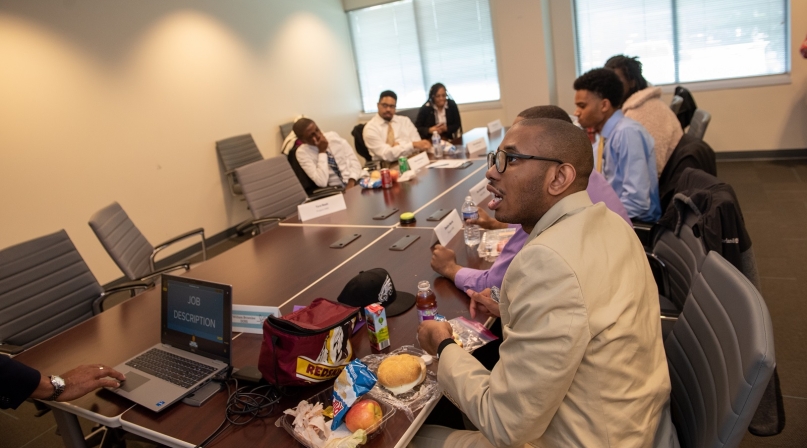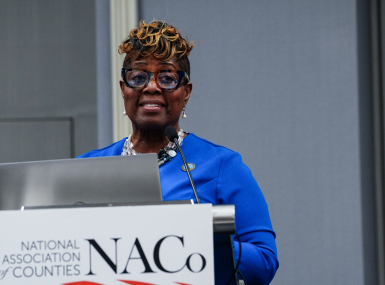County program offers opportunities for developmentally disabled residents

Key Takeaways
The twins were the pillars of the Prince George’s County, Md. Department of Aging.
For three decades, they worked in various clerical positions. Their developmental disabilities may have guided their lives’ journeys leading up to the county’s employ, but once there, they made careers of their own, up until they retired from the county after 30 years.
That was something Karen Sylvester remembered from early in her time with the county.
“If you come in and you can work for 30 years, you can take care of yourself and you can have a pathway to retirement so that you can take care of yourself in later years… that’s all anybody wants — independence to be able to take care of themselves and live in the community,” said Sylvester, now manager of the county’s Aging and Disabilities Services Division.
The program, which sought opportunities in county government for residents with disabilities, atrophied after a few years, but 2018 saw its return, fortified as Project HIRE — offering apprenticeships in several different county agencies, stints that are designed to last roughly a year.
“It’s something we definitely wanted to get back to,” Sylvester said. “It’s something that made a difference in those boys’ lives, and it could do the same for other people with the right guidance.”
Valerie Berkley joined the county to manage Project HIRE as program coordinator, going to work recruiting county departments to participate.
“I knew for this to work, it can’t just be me being a one-woman show, it has to be collected within the community, and that’s what you see today,” Berkeley said. “If it wasn’t for supportive employment partners, we wouldn’t have the right spots for these candidates that we have every year.”
The apprenticeship aspect is fundamental — while the job functions may seem similar to an administrative support position, the program emphasizes growth, development and finding a role that not only capitalizes on a candidate’s skills but offers opportunity to adapt and take on new responsibilities. The job may be temporary, but it isn’t a temp job.
“We’re not just trying to place you at the grocery store, we’re not just trying to place you at a retail store, we want to make sure that whatever your skills are, let’s try to find a good match for you,” Berkeley said. “We’re together for a period of 9-12 months, but this could turn into your ‘forever.’”
The screening process is unlike most job interviews. Initial stages take on a “meet and greet” feel, aimed at lowering barriers of formality for candidates who may be new to this. On top of that, the participants, ages 18-25, may be coming directly from a school environment, with limited work experience.
“For many of them, just meeting strangers can be a nerve-wracking experience, and they’ll be meeting a number of people in their apprenticeship, so we try to start it off by keeping them comfortable. It’s just a conversation to figure out what skills they have and what interests they have that will help us find a match,” Berkeley said. “We do get some folks who are either non-verbal or just aren’t comfortable enough to share exactly what their different skill sets are, so we work around that as best we can. We try to find out if our opportunities are right for them.”
Their interests serve as an anchor and starting point as participants learn their way around cooperating agencies — currently the Department of Social Services, the sheriff’s office and the health department.
“If you have something like paper shredding, and it could be fine because a lot of participants, trust me, like that on the top of the list…that’s fine, but let’s make sure that we expose them to different things, let’s look at the overall culture,” Berkeley said. “What that means is having the right supervisor to coach them along, mentor them.”
Of the first cohort of 10 apprentices from 2018, two are still employed by Prince George’s County. Given the interruption from the COVID-19 pandemic, which forced many jobs to go remote, that long-term outcome isn’t terrible.
But beyond professional development, Berkeley sees immeasurable value in the personal growth apprentices can experience.
“I feel that once they are done with school, sometimes they get really stagnant, because adult services don’t always have stimulating programming, so it’s often up to families to help them grow,” she said. “This gives them a chance to develop their own routine, meet new people, face new challenges and come out of it with confidence. They can say ‘I’m valued, my work is valued, my opinions are valued… I get to have relationships that have nothing to do with mom, dad or my siblings.’”
Counties looking to form their own apprenticeship programs have to secure funding and partners. Finding departments with the flexibility and leadership willing to mentor young people with developmental disabilities is a careful balance, given the time commitment, but the county has found that program participants are more likely to favor the stability that comes with county employment, ultimately reducing turnover. Support from human resources, given the extensive onboarding that is necessary, is also crucial.
And the benefits aren’t limited to participants. Sylvester hopes that helping apprentices learn and grow helps colleagues, not just the mentors, see their office as more of a community, recognizing that everyone has a role in fostering an inclusive and successful work environment.
“It’s an education for them as well and they are trained and they are educated that everybody has value and so I think that’s been a large part of this,” Sylvester said. “It’s not just a job, but it’s educating people that everybody has something to offer.”
And Berkeley hopes that adds up to confidence and independence.
“I don’t have a perfect recipe for it, but it’s just beautiful to see that these young people mature and realize that not only am I able to work, but I can advocate for myself. They realized ‘I do want more,’” she said.
Attachments
Related News

National Association of Counties Launches Initiative to Strengthen County Human Services Systems
The National Association of Counties (NACo) announces the launch of the Transforming Human Services Initiative, a new effort to help counties modernize benefits administration, integrate service delivery systems and strengthen county capacity to fulfill our responsibility as America’s safety net for children and families.

Congress seeking ‘common-sense solutions’ to unmet mental health needs
Rep. Andrea Salinas (D-Ore.): “Right now, it is too difficult to access providers … and get mental health care in a facility that is the right size and also the appropriate acuity level to meet patients’ needs.”

Prince William County transforms crisis care through "No Wrong Door" approach
Prince William County, Va.’s Crisis Receiving Center is bridging the gap between emergency room care and traditional outpatient care in behavioral crisis response and reducing burden on local law enforcement and hospitals.
